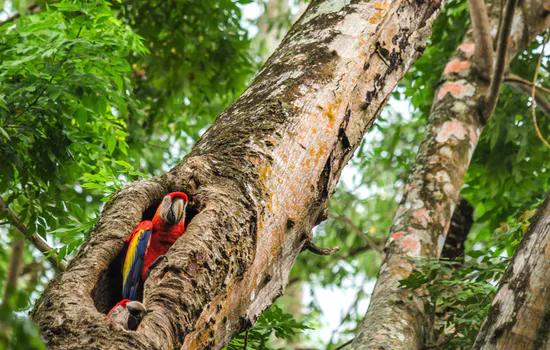AUTHOR The Ecoventura Team
Last year, we were thrilled to hear that Ecuador President Guillermo Lasso announced the 60,000 km² (23,166 square miles) expansion of the Galapagos Marine Reserve, designed in part to extend protection along the migratory corridor that protects the Galapagos Islands – a part of Ecuador – with Cocos Island – a part of Costa Rica.
The Galapagos is rightly regarded as one of the world’s biodiverse hotspots, home as it is to one of the highest levels of endemism anywhere on the planet; 80% of the land birds that live there live nowhere else on Earth, rising to a whopping 97% of the reptiles and land mammals that inhabit the islands. And in the waters of the archipelago, about 20% of the marine creatures live only in the Galapagos. With that in mind, it can only be a good thing that the incredible wildlife in and around these stunning islands are protected.

The expansion of the reserve was designed largely to protect the various migratory creatures – sharks, whales, turtles and manta rays to name but a few – that use the Galapagos-Cocos Swim way each year as they travel to feeding and breeding spots between the two sets of islands, braving the open ocean and the dangers that entails from fishing fleets along the way. A 30,000 km² fully protected no-take area (the green area in the image below) was created, banning all fishing in this area.
By protecting this route, more of these animals will be able to reach maturity and breed in peace, bolstering numbers and making their populations more resilient to threats they may face in the future.

Isla del Coco
Cocos Island is a small, remote island over 500km from the Costa Rican mainland. The entire island was designated a national park in 1978 – the only inhabitants are park rangers – and access to the island is limited to quick trips from passengers on passing vessels.
However, the draw is of course what lies beneath. The waters around the island are filled with coral reefs, volcanic tunnels and underwater caves, which are home to a bewildering array of marine species including hundreds of species of mollusc and an enormous number of fish.
As the other end of the Galapagos-Cocos migratory route, the island is particularly famous for the large numbers of hammerhead sharks, yellowfin tuna, giant manta rays, turtles and whale sharks that gather here – many of which have travelled the 800km from the Galapagos.

Credit: qcostarica.com
Connect to Costa Rica
So whilst access to Cocos Islands specifically is limited – although scuba trips to the area are certainly possible – adventurous travelers looking to extend their trip after a visit to the Galapagos could certainly consider a connection to Costa Rica in honor of our finned friends who make the journey every year.
With direct flights from Quito to the Costa Rican capital San Jose three times a week with Avianca, there are various ways to extend your trip in Latin America, and with Costa Rica’s expansive national parks, remarkable landscapes and biodiversity, it’s the perfect addition to extend your holiday after a Galapagos cruise.
From San Jose onwards, there are multiple flights to the US, UK, Europe and beyond, meaning extending your trip to Costa Rica couldn’t be easier.

Credit: Black Tomato
Costa Rica itself is a fascinating country, covered in lush, immensely biodiverse rainforest; it is famously leading efforts to halt and reverse deforestation to provide a haven for large numbers of species that live there, including capuchin and howler monkeys, jaguar, puma and tapir.
With a reputation for being the safest and most stable country in Central America, Costa Rica is a popular spot for tourists and well worth a visit. The country has pioneered the ecotourism movement, with many people visiting to see its national parks and protected forests.
And with long stretches of coastline on both its eastern, Caribbean shores and the Pacific to the west, the country boasts some of the finest beaches in the region – long expanses of soft, pale sand backing on to rich, verdant backdrops of rainforest and jungle. Truly a tropical paradise that may even – dare we say it – come close to competing with what the Galapagos has to offer.

Credit: Black Tomato
Where to stay
The country boasts two fantastic five-star Relais & Chateaux hotels – the perfect complement to our own Relais & Chateaux luxury expedition yachts, Origin & Theory by Ecoventura, the only R&C vessels in the Galapagos.
El Silencio Lodge and Spa, located in a cloud forest in the country’s central highlands, is a sophisticated eco-lodge with suites that blend into the landscape and offer stunning views across the rivers and mountains beyond. The soothing atmosphere of peaceful wellness is in perfect partnership with its surroundings, and with a spa and a restaurant using produce grown in the hotel’s own gardens, El Silencio is a wholesome, calming and uniquely soothing spot to enjoy a few days.

Nayara Springs, further north and also nestled in Costa Rica’s tropical rainforests, beneath the towering Arenal Volcano, is made up of a collection of private villas dotted through the jungle. Each villa enjoys its own plunge pool fed by mineral-rich thermal waters flowing down from the volcano itself, whilst the lodge also boasts a spa and yoga deck, as well as two restaurants. With various activities on offer, including riding, abseiling, zip lining or white-water rafting, there’s a huge amount on offer for all the family.

So whichever one you choose, for those not quite ready to go home after a week’s voyage in the Galapagos, a Costa Rica extension could be for you.
